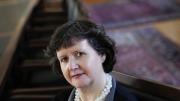Helen Shenton, an experienced innovator from the British Library who was deputy director of the Harvard University Library this past year, became executive director of the new, consolidated Harvard Library in mid January. “What we will be doing,” she said in an interview at Wadsworth House, “is creating something new…the concept of one Harvard library.” Recalling visits to Harvard’s 73 libraries when she first arrived at the University a year ago, she said she noted “a lot of enthusiasm” for the idea among library staff, who “want to work together in better ways” but have struggled to do so across “false boundaries.” Patrons, she added, also seek simple ways to access all of the collections once they are in a library or logged in to the system.
Under a management structure more than a year in the making (as part of a provost-initiated review of Harvard’s libraries), Shenton will report to and work with a new library board that has been given “strategic and decision-making authority for the whole of the Harvard Library. That’s very radical,” she said, when compared to the coordinated decentralization of the past. But during a “revolutionary time” in which people are changing how they access and use information, she explained, “We have got to not only respond, but be ahead of it, for the good of pedagogy and learning and research.”
Shenton credited a yearlong effort by the Library Implementation Workgroup (chaired by Divinity School professor of philosophy and theology David Lamberth) for gathering tremendously useful information about the entire library system, “which had never been looked at as a whole.” In order to effect necessary changes, she has identified several “strands of work” that, as of late January, were being pulled into a transition plan--involving issues of governance, funding, information technology, organization, and use of space--under the supervision of provost Steven E. Hyman and executive vice president Katie Lapp. Shenton, who focused on collection care at the British Library during an analogous period of consolidation, reiterated that “We must do this for the benefit of our patrons. It is for now, but it is also very much for the future.”
She emphasized that even as the planning continues, local decisions will remain important. “We need to balance shared services with the best of the local,” she said, “because the libraries have incredibly knowledgeable, specialized staff who work extremely closely with academic programs and with faculty, and know their subjects well. We must keep that whilst moving to some element of harmonization.”
Shenton has wasted no time in taking action, announcing in late January that Harvard would be joining Borrow Direct, an interlibrary loan program among the Ivy League universities that gives users access to a catalog of 50 million items for delivery in just four to five business days. “Borrow Direct,” she explained, “strongly reflects the aspirations that guide the new Harvard Library.”









